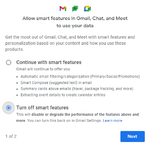-
Spielt gerade: GT7 | 60fps FTW
- Thread starter spy
- Start date
-
Spielt gerade: GT7 | 60fps FTW
Daten=Spielstände kann man doch sichern 
Edit: Wo wir schon bei Google sind. Kann ich bei Stadia Spielstände exportieren?
Software selbst und deren Aktivierung ist nochmal ein ganz eigenes, zunehmend unschönes Kapitel.
Aktuelles Beispiel: Microsoft hat mit dem Supportende von Office 2010 auch dessen Download entfernt. Wer also eine Onlinelizenz gekauft hat und kein Backup des Installers hat, steht jetzt dumm da. Deswegen ist es auch eine Unsitte statt eines vollständigen Installers nur einen dummen Webinstaller anzubieten.
Edit: Wo wir schon bei Google sind. Kann ich bei Stadia Spielstände exportieren?

Software selbst und deren Aktivierung ist nochmal ein ganz eigenes, zunehmend unschönes Kapitel.
Aktuelles Beispiel: Microsoft hat mit dem Supportende von Office 2010 auch dessen Download entfernt. Wer also eine Onlinelizenz gekauft hat und kein Backup des Installers hat, steht jetzt dumm da. Deswegen ist es auch eine Unsitte statt eines vollständigen Installers nur einen dummen Webinstaller anzubieten.
-
PSN-Name: Der_Hutmacher
Alle Google Dienste sind down, ist das erste mal, dass ich das sehe.
Hier ist noch alles grün:
https://www.google.com/appsstatus#hl=de&v=status
Hier ist noch alles grün:
https://www.google.com/appsstatus#hl=de&v=status
-
PSN-Name: Der_Hutmacher
Ein paar unserer Kunden haben ihre komplette Collobaration auf Google ausgelagert. Bei denen ist es sicher gerade zappenduster 😅
https://www.focus.de/digital/intern...-google-mail-und-google-maps_id_12771433.html
https://www.focus.de/digital/intern...-google-mail-und-google-maps_id_12771433.html
-
Spielt gerade: GT7 | 60fps FTW
We are writing to let you know that we recently announced new storage policies for Google Accounts using Gmail, Google Drive (including Google Docs, Sheets, Slides, Drawings, Forms, and Jamboard files) and/or Google Photos that bring us in line with industry practices.
Summary of the new policies (effective June 1, 2021):
• If you're inactive for 2 years (24 months) in Gmail, Drive or Photos, we may delete the content in the product(s) in which you're inactive. Google One members who are within their storage quota and in good-standing will not be impacted by this new inactive policy.
•If you exceed your storage limit for 2 years, we may delete your content across Gmail, Drive and Photos.
• If you're inactive for 2 years (24 months) in Gmail, Drive or Photos, we may delete the content in the product(s) in which you're inactive. Google One members who are within their storage quota and in good-standing will not be impacted by this new inactive policy.
•If you exceed your storage limit for 2 years, we may delete your content across Gmail, Drive and Photos.

Nein #1. Nach dem Nein #1 muß man nochmal bestätigen, daß man die Verarbeitung der Mailinhalte wirklich nicht will, obwohl man dadurch doch so viel verpaßt.
-
Spielt gerade: GT7 | 60fps FTW
YouTube:
https://blog.youtube/news-and-events/update-youtube-unlisted-links
Unlisted videos uploaded before 2017 will be made Private starting on July 23, 2021. We are also giving creators the option to opt out of this security update and keep their videos in their current state if they prefer.
-
Spielt gerade: GT7 | 60fps FTW
Daraus geht unter anderem hervor, dass Google intern mit dem Gedanken spielte, Epic Games vollständig oder zumindest teilweise zu kaufen.
Grund war laut The Verge, dass es bei Google die große Sorge gab, andere Softwareentwickler könnten sich Epic Games als Vorbild nehmen und ihre Apps - ähnlich wie Fortnite auf Android - am Google Play Store vorbei vermarkten, also per Sideloading.
Grund war laut The Verge, dass es bei Google die große Sorge gab, andere Softwareentwickler könnten sich Epic Games als Vorbild nehmen und ihre Apps - ähnlich wie Fortnite auf Android - am Google Play Store vorbei vermarkten, also per Sideloading.
In an internal document titled “Response to Epic”, a Google employee explained that the “install friction” associated with direct downloading was “not only a bad experience” for users but that Google knew “from its data that it will drastically limit [Epic’s] reach”. The document goes on to explain that “[f]uture [Fortnite] updates will be challenged re: targeting, update experience via web”; that the direct downloading approach was “most associated with malicious apps”, which would be “incompatible with [Epic’s] brand/demographics”; and that “[t]he approach will create significant user confusion, since [Google Play] will still attract [billions] of users who will search for Fortnite and run into deadends that aren’t clear how to resolve”.
Zuletzt editiert:
-
Spielt gerade: GT7 | 60fps FTW
YouTube Music Free ändert seine Features. Wird sehr ähnlich wie Spotify Free.
Obwohl YouTube im Namen kann man keine Videos mehr schauen .
.
https://support.google.com/youtubem...pp’s-new-listening-experience-by-oct-21?hl=en
Obwohl YouTube im Namen kann man keine Videos mehr schauen
 .
.https://support.google.com/youtubem...pp’s-new-listening-experience-by-oct-21?hl=en
-
Spielt gerade: GT7 | 60fps FTW
Google blocked ad competition and skirted privacy regulations, court filings reveal
Google allegedly had a closed-door meeting on August 6, 2019 with representatives of Facebook, Apple and Microsoft, where the companies discussed how to delay efforts to improve user privacy. Google said in a memo prepared for the meeting, “we have been successful in slowing down and delaying the [ePrivacy Regulation] process and have been working behind the scenes hand in hand with the other companies.”
-
Spielt gerade: GT7 | 60fps FTW
Google scannt eure Daten:
Google scannt Cloud-Dateien nach rechtswidrigen und schädlichen Inhalten
https://www.heise.de/news/Google-sc...drigen-und-schaedlichen-Inhalten-6298682.html
Google scannt Cloud-Dateien nach rechtswidrigen und schädlichen Inhalten
https://www.heise.de/news/Google-sc...drigen-und-schaedlichen-Inhalten-6298682.html
Kein Programm ist perfekt und gerade bei Kindesmissbrauch wird man nicht einen Scan über das Leben von Menschen entscheiden lassen.
Schauen also, bei Verdacht, noch Google Mitarbeiter drauf?
Anstandslosen Massenüberwachung von allen Konten und auch wegen Urheberrecht und normalen Pornos, die vielleicht Kunstblut enthalten..
Schauen also, bei Verdacht, noch Google Mitarbeiter drauf?
Anstandslosen Massenüberwachung von allen Konten und auch wegen Urheberrecht und normalen Pornos, die vielleicht Kunstblut enthalten..
-
Spielt gerade: GT7 | 60fps FTW
In den letzten Jahren reden gewisse Kreise Passwörter schlecht, man solle doch lieber andere Methoden benutzen.
OAuth2 ist so ein Ding - nur leider weit entfernt von einem simplen Standard. Der Entwickler von Pegasus Mail:
Das Beste kommt zum Schluß beim Versuch sich bei Google für die OAuth2 Nutzung zu registrieren:
https://www.pmail.com/devnews.htm
OAuth2 ist so ein Ding - nur leider weit entfernt von einem simplen Standard. Der Entwickler von Pegasus Mail:
Very annoyingly, sites like GMail and Microsoft's outlook.com site have taken to calling OAUTH2 "modern authentication", as if this somehow marks it as a well-thought-out, balanced mechanism: unfortunately, neither is true.
In my nearly thirty-five years of writing software in service of the Internet, OAUTH2 is the worst-conceived piece of software design I have ever encountered. More troublingly, it shows the increasing levels of control and power exercised by large, usually American corporations over the Internet, and the almost complete disregard they have for its historical openness and inclusiveness. OAUTH2 is a major step on the way to an Internet where the only players are large corporations, serving their own interests in the name of profit and power.
OAUTH2 potentially requires client developers to produce different modules for every service to which they wish to provide the ability to connect. This is clearly a nonsense, and can be viewed as a cynical corporate attempt to squeeze out small-to-medium developers who simply won't have the resources to be able to provide custom-tuned implementations for every OAUTH2 provider.
client developers, such as myself, are required to register their program with every OAUTH2 provider they wish to support.
...
But there's an even darker aspect to this requirement that is perhaps not immediately apparent: what happens if a site declines to accept your registration, or revokes your registration at a later time? Suddenly, a corporation (because the large players are all corporations) has control over whether or not your program is useful to your users: in other words, after thirty-five years of providing Pegasus Mail as a service to the broader Internet, I now find myself in a place where its usefulness and applicability is becoming subject to the whims of large, unaccountable corporations.
...
But there's an even darker aspect to this requirement that is perhaps not immediately apparent: what happens if a site declines to accept your registration, or revokes your registration at a later time? Suddenly, a corporation (because the large players are all corporations) has control over whether or not your program is useful to your users: in other words, after thirty-five years of providing Pegasus Mail as a service to the broader Internet, I now find myself in a place where its usefulness and applicability is becoming subject to the whims of large, unaccountable corporations.
I have today attempted to submit my application, Pegasus Mail, to GMail to go through their "validation process". Clicking the button that said, simply enough, "Publish App" took me to a bewildering, convoluted multi-list screen of different terms, conditions and requirements — even including the demand that I make a Youtube video showing the code operating (seriously?!).
That, while burdensome, confusing and complicated would probably have been manageable — and of course, it's all freighted in terms of "protecting GMail users' data", so you cannot be seen to criticize it without appearing to be somehow irresponsible… But right at the end is the sucker punch — Google will charge you from "$10,000 to $75,000 or more" (their words, not mine) for this, and will require you to go through the process (and of course, pay the fee) annually.
That, while burdensome, confusing and complicated would probably have been manageable — and of course, it's all freighted in terms of "protecting GMail users' data", so you cannot be seen to criticize it without appearing to be somehow irresponsible… But right at the end is the sucker punch — Google will charge you from "$10,000 to $75,000 or more" (their words, not mine) for this, and will require you to go through the process (and of course, pay the fee) annually.
Habe ehrlich gesagt nicht so die Probleme mit OAuth2, da der Auth Flow, vor allem bei den Big Playern, so ziemlich gleich abläuft kann man sich da einfach ne Klasse erstellen der man nur die gewünschte URL übergibt. Das mit den Gebühren bei der GMail Geschichte ist aber echt doof, einer der Gründe wieso ich nichts für iOS mache, da darf man auch jährlich dafür bezahlen das man den App Store mit Apps versorgt.
